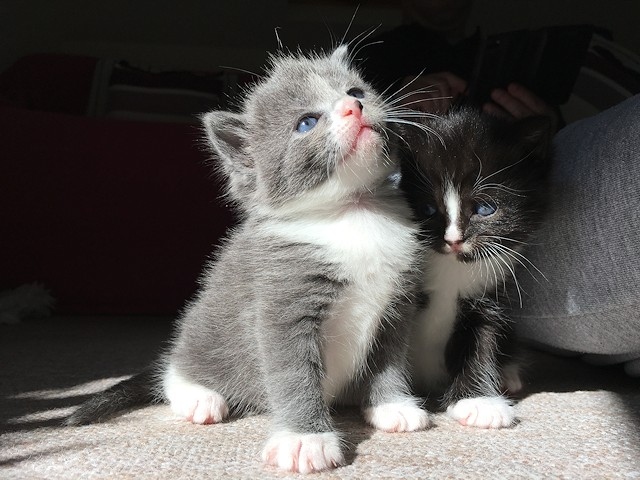RSPCA urges public to do their research as the UK sees a boom in kitten buying
Date published: 26 October 2020

This July saw Google searches for ‘Kittens near me’ increase sixfold compared to the same period last year
A boom in kitten buying could lead to more cats coming into rescue centres and needing new homes, warns the RSPCA.
This July saw Google searches for ‘Kittens near me’ increase sixfold compared to the same period last year (a 667% increase). During the lockdown, there has also been an 188% increase in searches for kittens within just a few months.
Alice Potter, the RSPCA’s cat welfare expert, said: “It’s fantastic that so many people are interested in bringing a cat into their home this year. However, with such high increases in people searching for kittens online, it’s important that prospective owners are doing their research and not buying a kitten on impulse. This means making sure they have the time, money and resources to care for a cat for the rest of their lives, but also ensuring that if buying a kitten, they are buying a healthy and happy kitten from a responsible breeder.
“It’s true that we see much higher cases of puppy farms than unscrupulous kitten breeders, but it does happen which is why it’s so important to do your research and make sure you’re buying from a reputable seller.
“Sadly, we do see cases of cats coming into our care who have been bought without the correct vaccinations, care or attention and the results can not only be devastating for the cats themselves but also the new owners who have to provide the time and cost it takes to look after these very poorly kittens. This is why the RSPCA and other cat charities have come together to create The Kitten Checklist to provide vital information, such as ensuring you see the kitten with its mum and siblings in the place where they were bred, and peace of mind for anyone looking to bring a kitten into their home.”
Cats are popular pets with the charity rehoming 24,095 cats last year - that’s one cat rehomed every 20 minutes across England and Wales. Since the start of the year, the RSPCA has dealt with more than 45,000 incidents relating to cats, meaning there are lots of cats in its care looking for homes – and that’s just one charity.
The UK has been facing a cat overpopulation crisis for many years, and Cats Protection warns, that while it might be tempting to buy kittens for adoption through online listings, adverts or on social media, it isn’t recommended as it isn’t always possible to guarantee that kittens listed are from a reputable breeder, and your new feline friend could end up with future health issues.
The Blue Cross says some home breeders – often called ‘back yard breeders’ – allow their pets to have a litter just so they can bring in an extra income, without considering vet checks, vaccinations, microchipping, neutering or spaying. By choosing to adopt a rescue cat, you can help the cat overpopulation crisis as well as giving a pet a loving home.
During the lockdown, there has also been a 114% increase in the amount of people searching for cats to adopt on the RSPCA’s Find a Pet page compared to the previous year.
Alice added: “It’s great to see so many people are looking to adopt a rescue cat with more than a million people visiting our cat Find a Pet page during the pandemic.
“We are braced for a kitten season boom next year as routine neutering procedures had to be put on hold during the lockdown. This means that whilst the UK is already facing a cat overpopulation crisis, we may now see even more unplanned litters of kittens. If you’ve got a kitten during lockdown, it’s so important to get them booked into your vets for a spay or a snip.
“Kittens can get pregnant from just four months old and there may be a longer wait than usual at some vet practices due to the pandemic, so it’s important to get them booked in early. We believe neutering from four-months-old can help tackle the overpopulation crisis and ensure we don’t see more unwanted litters being born and putting extra strain on rescue centres like the RSPCA.”
There are an estimated 10.9 million pet cats in the UK according to the 2019 PDSA PAW Report which also reports that 92% of owned cats are neutered. It is difficult to predict how many more kittens may be born due to the lockdown restrictions, however last year, six of the leading cat welfare charities neutered a total of 216,261 cats.
This figure helps to demonstrate the large number of cats neutered by charities each year and a reduction in these numbers during the Covid-19 crisis could lead to more unplanned and unwanted litters being born, possibly ending up in the care of a cat welfare charity.
If you’re looking to bring a feline friend into your home, consider adopting a cat or kitten before buying a kitten from a breeder or purchasing online.
Locally, you can adopt a rescue cat or kitten from the likes of the RSPCA, Cats Protection, Bleakholt Animal Sanctuary and Bart's Legacy Cat Refuge:
- RSPCA Rochdale: www.rspca-rochdale.org.uk
- Cats Protection Rochdale: www.cats.org.uk/rochdale
- Bleakholt: www.bleakholt.org
- Bart's Legacy: www.facebook.com/groups/360563494690005
Do you have a story for us?
Let us know by emailing news@rochdaleonline.co.uk
All contact will be treated in confidence.
Most Viewed News Stories
To contact the Rochdale Online news desk, email news@rochdaleonline.co.uk or visit our news submission page.
To get the latest news on your desktop or mobile, follow Rochdale Online on Twitter and Facebook.


